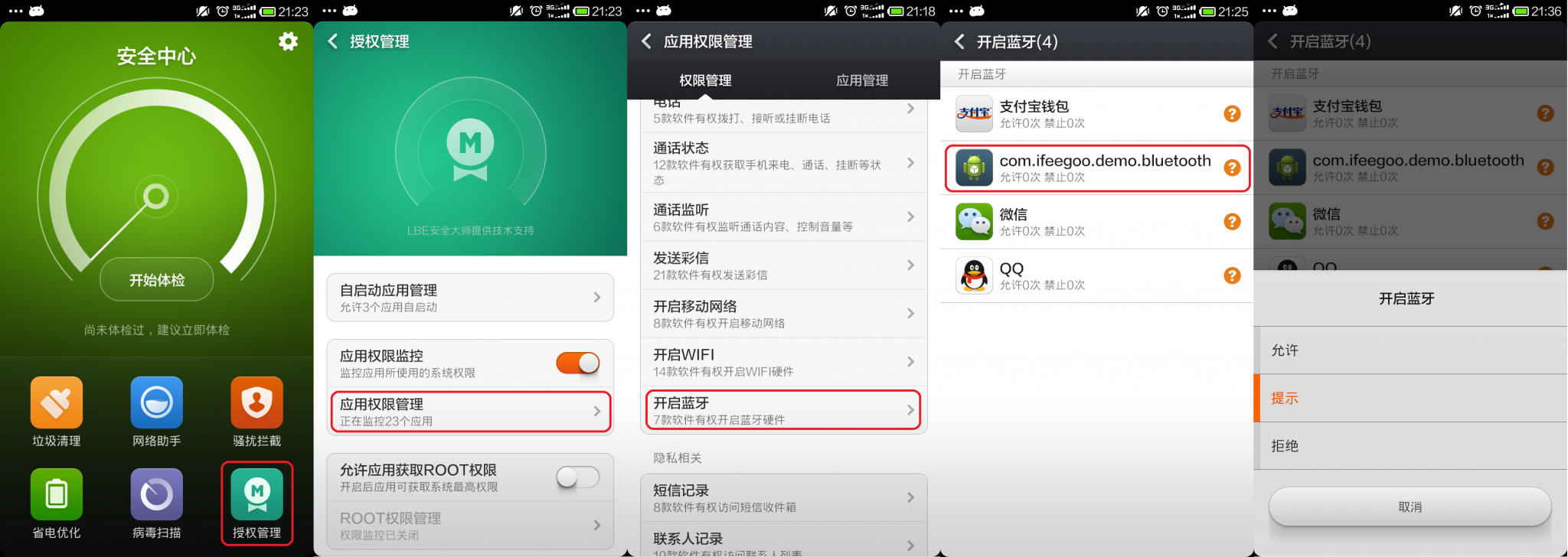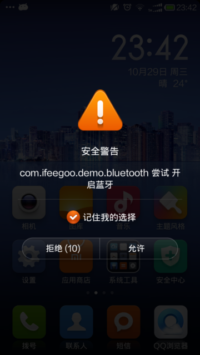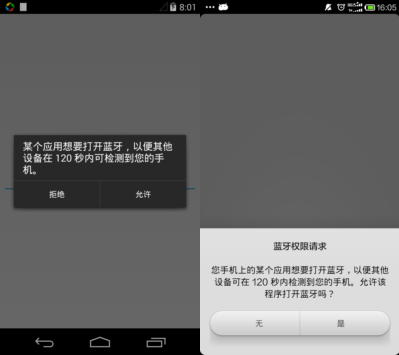原文网址:http://www.ifeegoo.com/android-turn-on-and-turn-off-bluetooth.html
摘要:Android 中打开和关闭 Bluetooth 的代码虽然并不困难,但是我们还是需要注意一些细节和异常情况,这样我们才能更好的优化我们的与 Bluetooth 相关的应用。
Runtime Environment
OS: Windows 8.1
IDE: ADT Bundle v22.6.2
Device:
Nexus 5 / Android 4.4.4
MI 2SC / MIUI-4.7.11 (Android 4.1.1 JRO03L)
Android 中打开和关闭 Bluetooth 的代码虽然并不困难,但是我们还是需要注意一些细节和异常情况,这样我们才能更好的优化我们的与 Bluetooth 相关的应用。
在研究打开和关闭 Bluetooth 之前,我们应该了解 Android 版本和 Bluetooth 版本之间的关系,请参考本博客文章 《Android 版本与 Bluetooth 版本之间的关系》。
Android 在 Android 2.0 Eclair / API Level 5 中就已经有开放的操作 Bluetooth 的 API 了,在此版本已经有以下公开类:
2 |
* 本地 Bluetooth 适配器,执行基本的 Bluetooth 任务,例如:初始设备扫描、查询已经绑定 |
3 |
* (或已经配对)的设备、通过已知的 MAC 地址来实例化 BluetoothDevice 对象、创建 |
4 |
* BluetoothServerSocket 来监听其它设备的连接请求等。 |
9 |
* 描述设备的一般特性和能力。例如,它会指定一般设备类型,例如:手机、电脑、耳机等,还 |
10 |
* 有是否支持音频或电话等服务。但是不能可靠的描述诸如设备支持哪些 Profile 或者 Service。 |
15 |
* 表示一个远程的 Bluetooth 设备。它能让你与各个设备创建连接或者查询信息。 |
21 |
* Bluetooth socket 和 TCP socket 有些类似。最普通的 Bluetooth socket 类型是 RFCOMM, |
22 |
* 这是 Android API 支持的类型。RFCOMM 是一个方向性的连接。通过 Bluetooth 传输流。 |
23 |
* 同样也称作 SPP (Serial Port Profile)。 |
25 |
BluetoothServerSocket.java |
Android 中打开 Bluetooth:有以下三种方法:
1.强制打开
2.调用系统弹出框提示用户打开
3.跳转到系统设置中让用户自己打开
1.强制打开 Bluetooth 的代码:
1 |
BluetoothAdapter.getDefaultAdapter() 需要注册权限: |
2 |
<uses-permission android:name="android.permission.BLUETOOTH" /> |
4 |
BluetoothAdapter.enable() 需要注册权限: |
5 |
<uses-permission android:name="android.permission.BLUETOOTH_ADMIN" /> |
4 |
* @author ifeegoo www.ifeegoo.com |
7 |
public class BluetoothManager |
11 |
* 当前 Android 设备是否支持 Bluetooth |
13 |
* @return true:支持 Bluetooth false:不支持 Bluetooth |
15 |
public static boolean isBluetoothSupported() |
17 |
return BluetoothAdapter.getDefaultAdapter() != null ? true : false; |
21 |
* 当前 Android 设备的 bluetooth 是否已经开启 |
23 |
* @return true:Bluetooth 已经开启 false:Bluetooth 未开启 |
25 |
public static boolean isBluetoothEnabled() |
27 |
BluetoothAdapter bluetoothAdapter = BluetoothAdapter |
30 |
if (bluetoothAdapter != null) |
32 |
return bluetoothAdapter.isEnabled(); |
39 |
* 强制开启当前 Android 设备的 Bluetooth |
41 |
* @return true:强制打开 Bluetooth 成功 false:强制打开 Bluetooth 失败 |
43 |
public static boolean turnOnBluetooth() |
45 |
BluetoothAdapter bluetoothAdapter = BluetoothAdapter |
48 |
if (bluetoothAdapter != null) |
50 |
return bluetoothAdapter.enable(); |
以上强制打开 Bluetooth 是调用了 BluetoothAdapter.enable() 方法。首先需要获取 BluetoothAdapter 对象,如果这个对象为 null 的话,说明当前设备不支持 Bluetooth 功能。还有以下几点需要注意:
1° 在 Nexus 5 Android 4.4.4 原生系统中,在没有任何其它管理 Bluetooth 权限的应用情况下,调用强制打开 Bluetooth 的方法,没有任何提示就直接打开 Bluetooth 了。
2° 在小米手机 MI 2SC / MIUI-4.7.11 (Android 4.1.1 JRO03L) 上系统自带的 “安全中心” – “应用权限管理” – “开启蓝牙” 中,有三种设置:
允许:调用强制打开 Bluetooth 代码,没有任何提示,Bluetooth 被成功打开。
提示:会弹出提示框,提示安全警告 “ ***应用尝试开启蓝牙”,可以选择“拒绝”或“允许”,还有记住此次选择(备注:如果不记住的话,下次还会弹出同样的提示框,除非你自己去修改了应用开启蓝牙的权限)。
拒绝:调用强制打开 Bluetooth 代码,没有任何提示,Bluetooth 强制打开失败。
备注:各种手机自带的权限管理功能或者第三方权限管理应用略有不同。
3° 对于 BluetoothAdapter.enable() 这个方法,API 中有以下说明 (备注:初始 API 中,如 Android 2.0 Eclair / API Level 5 中并没有这段提示)
Bluetooth should never be enabled without direct user consent. If you want to turn on Bluetooth in order to create a wireless connection, you should use the ACTION_REQUEST_ENABLE Intent, which will raise a dialog that requests user permission to turn on Bluetooth. The enable() method is provided only for applications that include a user interface for changing system settings, such as a “power manager” app.
没有直接的用户的允许绝不要开启 Bluetooth。如果你想要打开 Bluetooth 创建一个无线连接,你应当使用 ACTION_REQUEST_ENABLE Intent,这样会弹出一个提示框提示用户是否开启 Bluetooth,enable() 方法仅提供给有 UI 、更改系统设置的应用来使用,例如“电源管理”应用。
从以上官方 API 提示可以看出:不建议你调用此方法来打开 Bluetooth,至少是在没有任何用户提醒的前提下!


2.调用系统弹出框提示用户打开:
1 |
this.startActivityForResult(requestBluetoothOn, REQUEST_CODE_BLUETOOTH_ON) 需要注册权限: |
2 |
<uses-permission android:name="android.permission.BLUETOOTH" /> |
1 |
public class MainActivity extends Activity |
4 |
* 自定义的打开 Bluetooth 的请求码,与 onActivityResult 中返回的 requestCode 匹配。 |
6 |
private static final int REQUEST_CODE_BLUETOOTH_ON = 1313; |
9 |
* Bluetooth 设备可见时间,单位:秒。 |
11 |
private static final int BLUETOOTH_DISCOVERABLE_DURATION = 250; |
14 |
protected void onCreate(Bundle savedInstanceState) |
16 |
super.onCreate(savedInstanceState); |
17 |
this.setContentView(R.layout.activity_main); |
19 |
if ((BluetoothManager.isBluetoothSupported()) |
20 |
&& (!BluetoothManager.isBluetoothEnabled())) |
22 |
this.turnOnBluetooth(); |
27 |
* 弹出系统弹框提示用户打开 Bluetooth |
29 |
private void turnOnBluetooth() |
32 |
Intent requestBluetoothOn = new Intent( |
33 |
BluetoothAdapter.ACTION_REQUEST_ENABLE); |
37 |
.setAction(BluetoothAdapter.ACTION_REQUEST_DISCOVERABLE); |
40 |
requestBluetoothOn.putExtra( |
41 |
BluetoothAdapter.EXTRA_DISCOVERABLE_DURATION, |
42 |
BLUETOOTH_DISCOVERABLE_DURATION); |
45 |
this.startActivityForResult(requestBluetoothOn, |
46 |
REQUEST_CODE_BLUETOOTH_ON); |
50 |
protected void onActivityResult(int requestCode, int resultCode, Intent data) |
53 |
if (requestCode == REQUEST_CODE_BLUETOOTH_ON) |
58 |
case Activity.RESULT_OK: |
65 |
case Activity.RESULT_CANCELED: |
对于以上弹出系统弹框提示用户打开 Bluetooth 的代码,有以下几点需要注意:
1° 这种调用系统的弹出框提示用户打开 Bluetooth 的方式,一般不会受到系统或者第三方权限管理应用的阻止。只有当你不提示用户的情况下,可以理解为“偷偷摸摸”的打开 Bluetooth ,这个是被认为侵犯用户的知情权,系统或者第三方权限管理应用可能加以阻止:直接禁止不提示用户的情况下打开 Bluetooth,或者提示用户,又或者是让用户自己选择哪些应用可以强制开启 Bluetooth。而在 Nexus 5 / Android 4.4.4 原生系统强制打开 Bluetooth 是没有任何提示,并且可以成功打开。
2° 弹出系统的提示框提醒用户打开 Bluetooth 的主要代码:
this.startActivityForResult(requestBluetoothOn,REQUEST_CODE_BLUETOOTH_ON);
注意:这个方法是需要 Activity 的对象来调用的!并且需要在 Activity 中重写 onActivityResult 方法来获取用户操作弹出提示框的结果!
3° 这种弹出的系统弹框,根据系统的不同,UI 会有所不同,下图左边是 Nexus 5 Android 4.4.4 系统手机显示效果,右边是小米手机 MI 2SC / MIUI-4.7.11 (Android 4.1.1 JRO03L) 系统显示的效果:

4° 如果你只设置了 Bluetooth 设备的可见时间,而不去调用 setAction(BluetoothAdapter.ACTION_REQUEST_DISCOVERABLE) 方法的话,Bluetooth 依然是不可见的。你设置的 Bluetooth 的可见时间是不生效的,当前 Android 系统的 Bluetooth 不可见!
5° 设置 Bluetooth 设备的可见时间的时候,在 Android 4.4.2 官方 API 中的说明如下:
The current default is 120 seconds, and requests over 300 seconds will be capped. These values could change.
当前默认值是 120s ,300s 是上限。这些值可能会变。
目前测试出来的有以下结论:
— 可设置的可见时间为 [1,3600] s ,也就是最小1秒钟,最大1个小时。
— 设置的可见时间为 0 时,表示打开 Bluetooth 之后一直可见,设置小于0或者大于3600 时,系统会默认为 120s。
6° 如果你设备的 Bluetooth 已经打开,而且你不设置设备的可见时间的话,调用以上开启 Bluetooth 的方法,是不会有任何提示的。当然,如果 Bluetooth 已经开启,也可以通过这个方法来修改 Bluetooth 的可见性。
3.跳转到系统设置中让用户自己打开:
2 |
this.startActivity(new Intent(Settings.ACTION_BLUETOOTH_SETTINGS)); |
考虑到涉及用户隐私和用户体验,推荐以下方式开启 Bluetooth :
1° 采用强制开启 Bluetooth 的方式打开 Bluetooth ,但是调用强制开启 Bluetooth 代码之前,我们自己在应用中提示用户,我们的应用需要开启 Bluetooth ,让用户自己选择是否开启 Bluetooth 。自己在应用中提示用户我们需要开启 Bluetooth 相对于弹出系统的提示框提示用户当前应用需要开启 Bluetooth 的优势在于我们可以控制提示的内容和提示的方式以及 UI。
2° 假若用户选择了开启 Bluetooth,但是强制开启 Bluetooth 失败,比如系统自带的权限管理禁止你的应用开启 Bluetooth ,我们不去提示用户说当前系统禁止了应用开启 Bluetooth,让用户自己去解除禁止。这样显然用户体验很差。这种情况下,我们再去调用弹出系统提示框提醒用户打开 Bluetooth 即可。这种方式一般系统或者第三方应用不会禁止。
3° 如果弹出系统提示框提醒用户打开 Bluetooth 有问题的话,最后采用提示用户自己去系统 Bluetooth 设置中打开 Bluetooth,跳转到系统的 Bluetooth 设置界面。
Android 中关闭 Bluetooth:有以下俩种方法:
1.强制关闭
2.跳转到系统设置中让用户自己关闭
1.强制关闭:
1 |
BluetoothAdapter.getDefaultAdapter() 需要注册权限: |
2 |
<uses-permission android:name="android.permission.BLUETOOTH" /> |
4 |
BluetoothAdapter.disable() 需要注册权限: |
5 |
<uses-permission android:name="android.permission.BLUETOOTH_ADMIN" /> |
4 |
* @author ifeegoo www.ifeegoo.com |
7 |
public class BluetoothManager |
10 |
* 当前 Android 设备是否支持 Bluetooth |
12 |
* @return true:支持 Bluetooth false:不支持 Bluetooth |
14 |
public static boolean isBluetoothSupported() |
16 |
return BluetoothAdapter.getDefaultAdapter() != null ? true : false; |
20 |
* 当前 Android 设备的 bluetooth 是否已经开启 |
22 |
* @return true:Bluetooth 已经开启 false:Bluetooth 未开启 |
24 |
public static boolean isBluetoothEnabled() |
26 |
BluetoothAdapter bluetoothAdapter = BluetoothAdapter |
29 |
if (bluetoothAdapter != null) |
31 |
return bluetoothAdapter.isEnabled(); |
38 |
* 强制开启当前 Android 设备的 Bluetooth |
40 |
* @return true:强制打开 Bluetooth 成功 false:强制打开 Bluetooth 失败 |
42 |
public static boolean turnOnBluetooth() |
44 |
BluetoothAdapter bluetoothAdapter = BluetoothAdapter |
47 |
if (bluetoothAdapter != null) |
49 |
return bluetoothAdapter.enable(); |
56 |
* 强制关闭当前 Android 设备的 Bluetooth |
58 |
* @return true:强制关闭 Bluetooth 成功 false:强制关闭 Bluetooth 失败 |
60 |
public static boolean turnOffBluetooth() |
62 |
BluetoothAdapter bluetoothAdapter = BluetoothAdapter |
65 |
if (bluetoothAdapter != null) |
67 |
return bluetoothAdapter.disable(); |
以上强制关闭 Bluetooth 是调用了 BluetoothAdapter.disable() 方法。首先需要获取 BluetoothAdapter 对象,如果这个对象为 null 的话,说明当前设备不支持 Bluetooth 功能。还有以下几点需要注意:
1° 目前发现常见的系统或者第三方权限管理应用好像对关闭 Bluetooth 并不做限制。
2° 如果系统或者第三方权限管理应用限制你的应用关闭 Bluetooth 的话,请参考强制开启 Bluetooth 要注意的点 1° 和 2°。
3° 对于 BluetoothAdapter.disable() 这个方法,API 中有以下说明 (备注:初始 API 中,如 Android 2.0 Eclair / API Level 5 中并没有这段提示)
Bluetooth should never be disabled without direct user consent. The disable() method is provided only for applications that include a user interface for changing system settings, such as a “power manager” app.
没有直接的用户的允许绝不要关闭 Bluetooth。disable() 方法仅提供给有 UI 、更改系统设置的应用来使用,例如“电源管理”应用。
从以上官方 API 提示可以看出:不建议你调用此方法来关闭 Bluetooth,至少是在没有任何用户提醒的前提下!
2.跳转到系统设置中让用户自己关闭:
2 |
this.startActivity(new Intent(Settings.ACTION_BLUETOOTH_SETTINGS)); |
考虑到涉及用户隐私和用户体验,推荐以下方式关闭 Bluetooth :
1° 采用强制关闭 Bluetooth 的方式关闭 Bluetooth ,但是调用强制关闭 Bluetooth 代码之前,我们自己在应用中提示用户,我们的应用需要关闭 Bluetooth ,让用户自己选择是否关闭 Bluetooth 。自己在应用中提示用户我们需要关闭 Bluetooth ,暂时没有发现 Android 有提供了弹出系统提示框提示用户关闭 Bluetooth 的 API。
2° 假若用户选择了关闭 Bluetooth,但是强制关闭 Bluetooth 失败,比如系统自带的权限管理禁止你的应用关闭 Bluetooth ,我们不去提示用户说当前系统禁止了应用关闭 Bluetooth,让用户自己去解除禁止。这样显然用户体验很差。这种情况下,我们提示用户“由于某些原因导致应用关闭 Bluetooth 失败,请到系统设置中自己关闭 Bluetooth”,然后跳转到系统 Bluetooth 设置中。
 4° 如果你只设置了 Bluetooth 设备的可见时间,而不去调用 setAction(BluetoothAdapter.ACTION_REQUEST_DISCOVERABLE) 方法的话,Bluetooth 依然是不可见的。你设置的 Bluetooth 的可见时间是不生效的,当前 Android 系统的 Bluetooth 不可见!
4° 如果你只设置了 Bluetooth 设备的可见时间,而不去调用 setAction(BluetoothAdapter.ACTION_REQUEST_DISCOVERABLE) 方法的话,Bluetooth 依然是不可见的。你设置的 Bluetooth 的可见时间是不生效的,当前 Android 系统的 Bluetooth 不可见! 4° 如果你只设置了 Bluetooth 设备的可见时间,而不去调用 setAction(BluetoothAdapter.ACTION_REQUEST_DISCOVERABLE) 方法的话,Bluetooth 依然是不可见的。你设置的 Bluetooth 的可见时间是不生效的,当前 Android 系统的 Bluetooth 不可见!
4° 如果你只设置了 Bluetooth 设备的可见时间,而不去调用 setAction(BluetoothAdapter.ACTION_REQUEST_DISCOVERABLE) 方法的话,Bluetooth 依然是不可见的。你设置的 Bluetooth 的可见时间是不生效的,当前 Android 系统的 Bluetooth 不可见!




